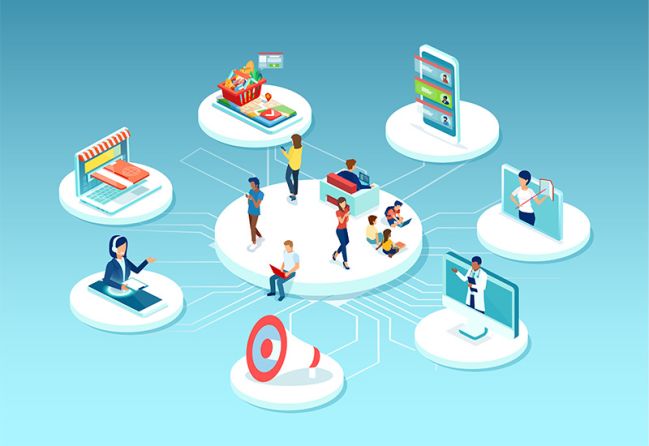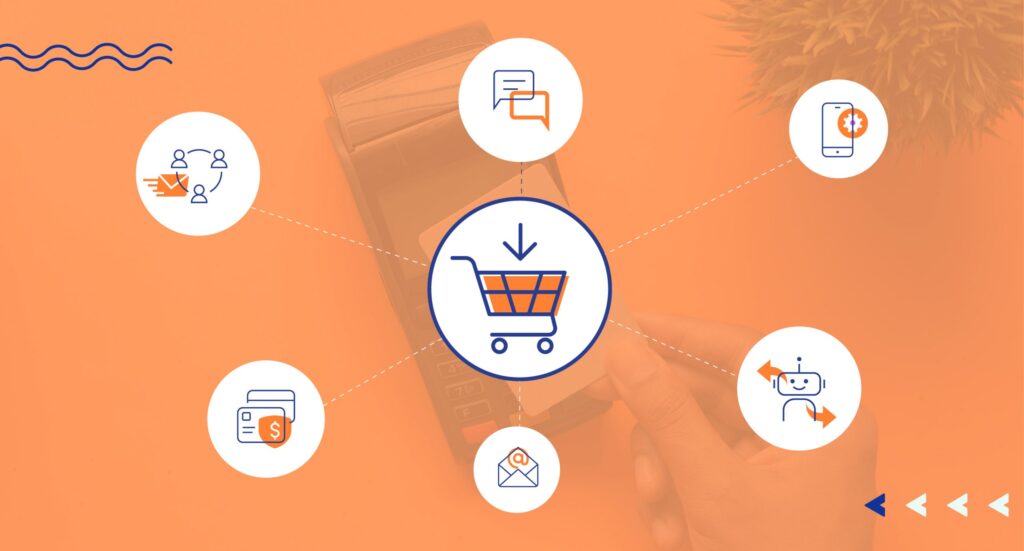
In today’s rapidly evolving digital world, the way businesses interact with customers has undergone a profound transformation. Omnichannel marketing has emerged as a non-negotiable strategy for companies striving to deliver exceptional customer experiences and gain a competitive edge.
This approach seamlessly integrates various marketing channels – from social media and email to websites and physical stores – to create a unified and consistent brand message across all touchpoints. As customer expectations for personalised and convenient interactions continue to soar, omnichannel marketing holds the key to business success.
It empowers businesses to engage with their target audience throughout their entire journey, resulting in higher customer satisfaction, brand loyalty, and ultimately, increased revenue. The growing importance of omnichannel marketing has created a wealth of exciting and lucrative marketing careers.
Professionals skilled in designing and executing omnichannel strategies are in high demand, opening up a range of opportunities in areas like marketing automation, data analysis, and customer experience management. SMS Varanasi is dedicated to equipping its BBA and MBA students with the knowledge and expertise required to excel in these dynamic careers in marketing.
By exploring omnichannel marketing principles, tools, and real-world applications, you will gain the skills necessary to become a sought-after marketing professional in the digital age.
Understanding the Omnichannel Marketing Landscape

Omnichannel marketing represents a fundamental shift in how businesses approach their customers. Here’s how it emphasises the key elements of this approach:
- Customer-Centric Approach: The days of product-focused marketing, where companies prioritised pushing out their wares, are dwindling. Today’s savvy consumers demand experiences tailored to their individual needs and preferences.
Omnichannel marketing places the customer at the core of every strategy. It allows businesses to understand their customers’ journeys across diverse touchpoints, enabling them to deliver relevant and timely messaging that builds meaningful relationships.
- Channel Integration: Omnichannel marketing thrives on the smooth integration of various communication channels. Key channels include:
- Website: A company’s digital storefront provides vital information, engages customers, and facilitates transactions.
- Social Media: Platforms like Facebook, Instagram, and Twitter are perfect for fostering brand awareness, building communities, and providing customer support.
- Email: Targeted email campaigns are effective for lead nurturing, personalized promotions, and fostering customer loyalty.
- Brick-and-Mortar: Physical stores remain a crucial touchpoint for many customers, emphasizing the need to bridge the gap between the online and offline worlds.
The true power of omnichannel marketing lies in the way these channels seamlessly intertwine, creating a unified and consistent customer experience.
- Consistent Branding: In a world overflowing with information, consistent branding is paramount. From your company’s logo and colour scheme to messaging and tone of voice, every aspect of your brand should shine through on each channel. This consistency reinforces your brand identity and fosters trust, ultimately driving customer loyalty.
A deep understanding of the omnichannel landscape is vital for those pursuing marketing careers. Companies increasingly require professionals adept at leveraging integrated channels and data-driven insights for exceptional customer experiences. Marketing automation tools streamline many of these processes, making them another valuable area of expertise for budding marketers.
Building The Omnichannel Marketing Strategy

Crafting a winning omnichannel marketing strategy isn’t a matter of guesswork. Here’s a framework for success:
Customer Journey Mapping
Understanding your customers’ journey is essential. Here’s how:
- Define Your Buyer Personas: Identify typical customer profiles with details like demographics, pain points, and goals.
- Chart the Journey: Map out each stage of engagement – from awareness to purchase and beyond. Consider every touchpoint, both online and offline.
- Identify Pain Points and Opportunities: Where do customers face friction? What are areas for exceeding expectations and increasing satisfaction?
By visualising these journeys, you uncover crucial insights into where to optimize your omnichannel approach.
Data-Driven Decisions
Omnichannel marketing should be informed by reliable data. Here’s how to gather it:
- Surveys: Gain direct customer feedback through surveys and questionnaires.
- Website Analytics: Track website traffic, user behaviours, and conversion rates.
- Social Media Metrics: Monitor engagement, reach, and sentiment on social platforms.
- CRM Data: Your customer relationship management system is a treasure trove of purchase history, preferences, and interactions.
By analysing this data, you can tailor messaging, identify high-performing channels, and continuously refine your strategy.
Personalisation
Generic marketing is easily overlooked; personalisation sets you apart. Omnichannel allows you to personalize at scale:
- Names and Preferences: Address customers by name in emails and recommendations.
- Purchase History: Use past purchases to suggest relevant products or services.
- Interests: Content and offers tailored to known customer interests increase engagement.
- Location-Based Offers: Leverage customer location for timely promotions.
Marketing automation tools are indispensable in streamlining your omnichannel efforts. These tools help schedule and personalize campaigns across channels, track performance, and nurture customers throughout their journeys.
Mastering omnichannel strategy positions you for a rewarding marketing career. Businesses across industries rely on experts who can create seamless, data-driven customer experiences. SMS Varanasi empowers you with the knowledge and tools to excel in this dynamic field.
Marketing Automation for Omnichannel Success
In the world of omnichannel marketing, where multiple channels and vast amounts of customer data demand attention, marketing automation becomes your best friend. Let’s delve into how it revolutionises your approach:
What is Marketing Automation?
Marketing automation refers to software platforms that streamline and automate repetitive marketing tasks across various channels. In an omnichannel context, this offers distinct benefits:
- Efficiency: Automation saves time and resources by handling routine tasks like sending emails, social media posts, and personalized recommendations.
- Scalability: It allows you to manage large-scale campaigns without requiring a massive team, enabling you to connect with more customers.
- Improved Targeting: Automation lets you use customer data to deliver the right message, to the right person, at the right time, across channels.
Popular Automation Tools: Your Omnichannel Powerhouses
Leading marketing automation tools include:
- HubSpot: Offers comprehensive features for email marketing, lead nurturing, social media management, and analytics.
- Marketo: A powerful platform known for its robust lead scoring, behaviour tracking, and in-depth reporting.
- Other Options: Salesforce Pardot, ActiveCampaign, and Mailchimp are also popular choices with omnichannel capabilities.
These tools equip you with features essential for omnichannel success, enabling you to create targeted campaigns and track your results effectively.
Use Cases: Automation in Action
Here are some classic omnichannel marketing use cases perfect for automation:
- Welcome Emails: Automated welcome email series build rapport with new subscribers, showcasing your brand and offers.
- Abandoned Cart Recovery: Triggered emails or SMS reminders can re-engage customers who leave items in their shopping carts, boosting conversions.
- Loyalty Programs: Automate point-based rewards, personalised offers, and birthday greetings to cultivate loyal customers.
- Lead Nurturing: Guide potential customers through different stages of the funnel with a series of emails and content tailored to their interests.
Omnichannel marketers skilled in using automation tools are in high demand. Companies recognise the value of streamlining processes, optimising campaigns, and delivering personalised customer experiences. By exploring marketing automation in your studies at SMS Varanasi, you set yourself on a path toward exciting and impactful careers in marketing.
Emerging Trends in Omnichannel Marketing

The field of omnichannel marketing is in constant flux, driven by technological advancements and changing consumer behaviours. Here are some key trends shaping the future:
AI and Machine Learning
Artificial intelligence (AI) and machine learning bring exciting new possibilities to omnichannel marketing:
- Hyper-Personalisation: AI analyses customer data to tailor recommendations, content, and offers with remarkable precision.
- Predictive Analytics: Machine learning algorithms can predict customer behaviour, allowing proactive, timely messaging.
- Campaign Optimisation: AI automates A/B testing and optimises channel allocation, maximising ROI.
Voice Search and Virtual Assistants
As consumers increasingly use voice assistants (like Alexa and Siri) for search and shopping, marketers must adapt:
- Natural Language Search: Optimising content for long-tail keywords and conversational phrases improves visibility in voice search results.
- Voice-Enabled Commerce: Creating streamlined purchase experiences for voice assistants can capture new opportunities.
- Voice Assistant Apps: Developing branded skills for popular assistants expands your reach into customers’ homes.
Omnichannel Analytics
Data is the lifeblood of successful omnichannel marketing. To understand your performance, track these key metrics, such as:
- Customer Lifetime Value (CLV): Measures total revenue generated by a customer over time, highlighting the impact of long-term engagement.
- Attribution Modelling: Assigns credit to different channels involved in a conversion path, revealing the true value of each touchpoint.
- Cross-Channel Engagement: Tracks how customers interact with various channels, pinpointing where they are most likely to engage.
Professionals skilled in using AI-powered tools, optimising for voice interactions, and interpreting omnichannel analytics will be highly sought after.
Careers in Omnichannel Marketing
The rise of omnichannel marketing has created a wealth of exciting career opportunities for marketing professionals. Here’s a glimpse into the roles, skills, and career paths available to you:
Typical Roles in Omnichannel Marketing
- Omnichannel Marketing Manager: Oversees the development and implementation of cohesive omnichannel strategies.
- Digital Marketing Strategist: Crafts broad digital marketing plans with a strong focus on aligning channels and optimising customer experiences.
- Customer Experience Specialist: Analyzes customer journeys and designs initiatives to improve satisfaction across touchpoints.
- Marketing Automation Specialist: Builds and manages automated campaigns using marketing automation platforms.
- Data Analyst: Focuses on gathering, analysing, and interpreting customer data to inform omnichannel decision-making.
Skills That Make You Stand Out
Omnichannel marketing calls for a blend of technical and soft skills:
Technical Skills:
- Data analysis and interpretation
- Proficiency in marketing automation tools
- Understanding of web analytics and SEO
- Working knowledge of CRM systems
Soft Skills:
- Exceptional communication and collaboration
- Creative problem-solving
- Project management and organization
- Customer-centric mindset
You may begin in a specialised role like email marketing or social media management and gradually progress to broader strategy roles. Companies prioritise professionals with proven success in orchestrating integrated omnichannel campaigns, leading to managerial and leadership positions.
Gaining hands-on experience through projects and case studies related to omnichannel marketing principles, marketing automation, and cutting-edge trends allows you to confidently enter the workforce and excel in dynamic careers in marketing.
Conclusion
Omnichannel marketing is essential for today’s businesses and opens up rewarding careers for savvy marketing professionals. SMS Varanasi empowers you with the knowledge and skills to succeed. Explore our courses, workshops, and internships to dive deeper into omnichannel strategies. Stay connected with SMS Varanasi for the latest insights and opportunities in this dynamic field!




